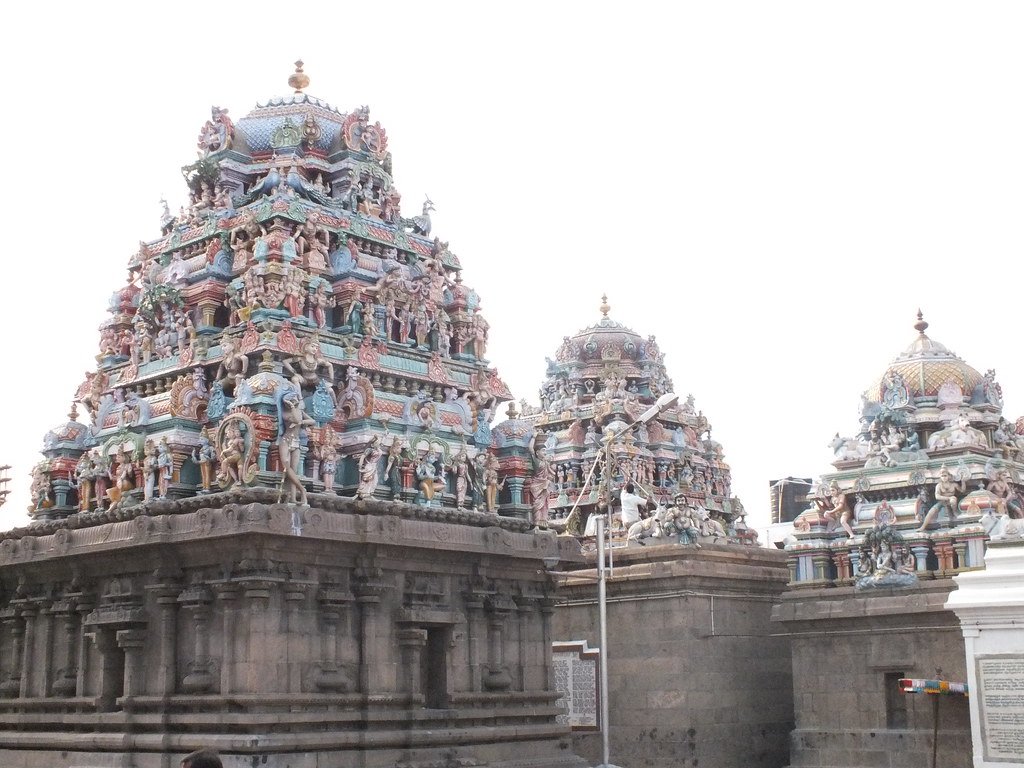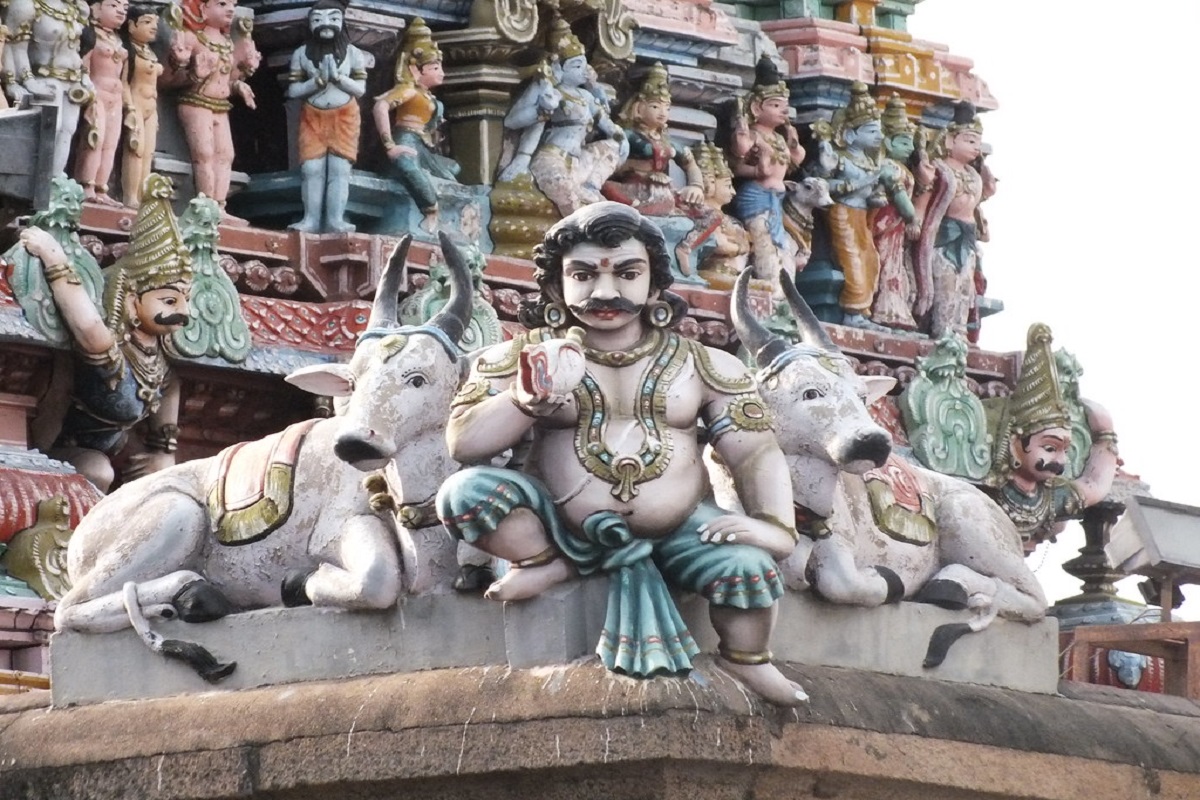Disclosure: We’re reader-supported. When you buy through links on our site, we may earn an affiliate commission at no extra cost to you. For more information, see our Disclosure page. Thanks.
Arulmigu Kapaleeswarar Temple
History: The Arulmigu Kapaleeswarar Temple, located in the heart of Mylapore in Chennai, India, is a revered Hindu temple dedicated to Lord Shiva, known here as Kapaleeswarar. The temple is an epitome of Dravidian architecture and stands as a landmark of spiritual and cultural significance in South India. The temple is believed to have been originally constructed over 1,500 years ago and has a rich history that intertwines mythology, architectural grandeur, and religious practices. It continues to be an important center of worship and attracts devotees from across the globe. The temple is also associated with the famous Tamil poet-saint, Appar, and is believed to have played a central role in the spread of Shaivism.
Architecture of the Temple: The Kapaleeswarar Temple is an excellent example of the intricate and grand Dravidian style of architecture. It is a large, expansive complex that includes multiple shrines, mandapams (halls), and towering gopurams (gateway towers). The temple’s main entrance is marked by a massive, beautifully sculpted gopuram, adorned with colorful deities and figures from Hindu mythology. The central sanctum houses the deity Kapaleeswarar, a manifestation of Lord Shiva, along with his consort, Goddess Karpagambal. The temple is known for its elaborate stone carvings, depicting various scenes from Hindu epics like the Ramayana and Mahabharata.
The sanctum, with its intricate designs and beautiful pillars, is the focus of devotion. The temple complex also features a large tank known as the “Temple Tank,” used for ritual bathing and religious ceremonies. The mandapams, particularly the Hall of 1000 Pillars, showcase the incredible craftsmanship of ancient artisans and reflect the temple’s rich heritage. The temple’s architectural layout follows the classical layout of South Indian temples, featuring a spacious courtyards, a towering gopuram, and intricately decorated pillars.

Events at the Temple: The Kapaleeswarar Temple hosts several important religious festivals throughout the year. The most significant among these is the Maha Shivaratri, a night dedicated to the worship of Lord Shiva, where devotees gather in large numbers to participate in prayers, chanting, and various rituals. Another important event is the Arupathimoovar Festival, celebrated with much fanfare and devotion. This festival is held in honor of the 63 Nayanmars, revered Shaivite saints, and features processions, rituals, and music.
The Thai Poosam festival, celebrated in the Tamil month of Thai (January-February), is also a major event at the temple. It involves elaborate rituals, processions, and offerings to Lord Murugan, the son of Shiva, with devotees often performing acts of devotion such as carrying kavadis (a ceremonial offering) as part of their penance. The Panguni Uthiram, a festival dedicated to the divine marriage of Lord Shiva and Goddess Parvati, also attracts a large number of devotees.
Apart from these, regular pujas, rituals, and offerings are conducted daily in the temple, and the temple calendar is filled with various events that are significant for the local community.
How to Reach: The Arulmigu Kapaleeswarar Temple is located in Mylapore, one of the oldest and most culturally vibrant areas in Chennai. It is easily accessible by all modes of transport:
- By Air: The nearest airport is the Chennai International Airport, which is approximately 14 kilometers away from the temple. From the airport, visitors can take a taxi or use public transport to reach the temple.
- By Train: The nearest railway station is Chennai Egmore, located about 4 kilometers from the temple. Another nearby station is Chennai Beach, about 3 kilometers away. Both stations are well-connected by local trains to various parts of Chennai.
- By Bus: The temple is well-served by Chennai’s extensive bus network. Several buses operate to and from Mylapore, with a bus stop just outside the temple.
- By Car: The temple is situated on Kutchery Road, and can be reached by private car or taxi from any part of the city.
Temple Pooja/ Aarti Timings: The temple offers daily worship and a variety of rituals, including abhishekam (ritual bathing of the deity), archana (chanting of the deity’s name), and aarti (light offering). The temple follows a fixed schedule for its daily poojas, typically as follows:
- Morning Pooja Timings: The first pooja of the day begins early, around 5:30 AM, followed by another session at 6:30 AM.
- Afternoon Pooja Timings: After a brief break, the temple reopens around 12:00 PM, with regular poojas continuing until around 1:00 PM.
- Evening Pooja Timings: The evening aarti begins at 6:00 PM, followed by the final pooja of the day around 7:00 PM.
- Maha Aarti/ Special Pooja: During special festivals or occasions, additional poojas are scheduled, including Maha Aarti at night, typically around 8:00 PM.
The temple also conducts specific rituals for devotees, including personal prayers, special abhishekams, and darshan sessions.
Service – Fee Details: The temple offers a range of services to its visitors, from basic darshan (viewing of the deity) to more personalized rituals and services:
- Darshan: Entry into the temple is free, and devotees can visit the shrine of Kapaleeswarar and Karpagambal for darshan at no charge.
- Special Darshan: There are options for a special darshan, which includes priority access to the sanctum. This service may involve a fee, typically in the range of INR 50 to INR 200, depending on the day and time.
- Abhishekam (Ritual Bathing of the Deity): Devotees can perform abhishekam for the deities. The cost for this service can vary, starting from around INR 500 to INR 1000 depending on the type of service.
- Prasadam (Sacred Offerings): Devotees may also purchase prasadam, which includes offerings like coconut, flowers, and other ritual items. Prasadam can be bought from the temple’s counters at nominal charges.
- Vow Offerings: Devotees can take vows such as kavadi, milk pots, and other types of vows as part of their devotion. The cost varies depending on the nature of the vow.
Contact Details:
- Temple Name: Arulmigu Kapaleeswarar Temple
- Location: Mylapore, Chennai, Tamil Nadu, India
- Phone Number: +91 44 2498 7110 (for general inquiries)
- Temple Office: +91 44 2498 7270
- Email: kapaleeswarartemple@gmail.com
- Website: https://mylaikapaleeswarar.hrce.tn.gov.in/
Nearby Attractions: Mylapore is a historic and vibrant locality with many other significant attractions, making it a hub for spiritual, cultural, and historical exploration. Some nearby attractions include:
- San Thome Basilica: A renowned Catholic church located just a few kilometers away from the Kapaleeswarar Temple, San Thome Basilica is one of the few churches in the world built over the tomb of an apostle (St. Thomas).
- Parthasarathy Temple: Another ancient and revered temple dedicated to Lord Vishnu, located about 2 kilometers from Kapaleeswarar Temple.
- Sri Ramakrishna Math: This peaceful retreat is dedicated to the teachings of Swami Vivekananda and is situated near the temple.
- Marina Beach: Located around 3 km away from Mylapore, this iconic beach is a popular spot for leisure and evening walks.
- Theosophical Society: A quiet, green space for meditation and reflection, located around 5 kilometers away.
FAQ’s and General Information about the Temple:
- What is the history of Kapaleeswarar Temple? The temple is believed to have been built over 1,500 years ago. It is dedicated to Lord Shiva and is considered one of the oldest and most significant temples in Chennai.
- Is photography allowed inside the temple? Photography is generally allowed in the outer courtyards of the temple. However, inside the sanctum, it is prohibited to maintain the sanctity of the temple.
- Can foreigners visit the temple? Yes, the temple is open to all visitors regardless of nationality, and many international devotees come to experience its spiritual ambiance.
- What are the temple’s dress code regulations? Devotees are expected to dress modestly. Men are typically expected to wear dhotis or trousers, and women are advised to wear sarees or other traditional Indian attire.
- Are there facilities for accommodation near the temple? Yes, there are several hotels and guesthouses near Mylapore that offer a variety of accommodation options ranging from budget to luxury.
- Can I offer flowers or other items at the temple? Yes, devotees are welcome to offer flowers, fruits, and other items as part of their prayers. These offerings can be purchased from the temple premises.
- Is there any special pooja for newly married couples? Yes, newlyweds often perform special poojas at the temple to seek blessings for a prosperous married life. It is advisable to book such poojas in advance.


